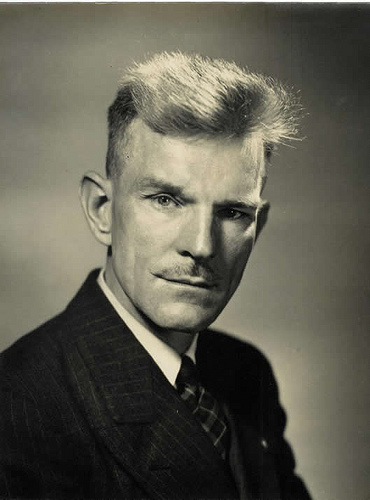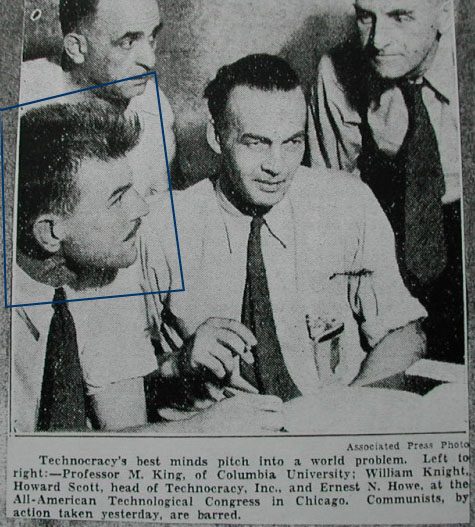Hubbert: King Of The Technocrats
Posted by Big Gav in hubbert, technocracy
 In the wake of the recent interview with Jay Hanson posted at The Oil Drum, there was some discussion of Hubbert's role in the Technocracy movement.
In the wake of the recent interview with Jay Hanson posted at The Oil Drum, there was some discussion of Hubbert's role in the Technocracy movement.
I hadn't been aware that Hubbert was a Technocrat (or that the technocrats were an organised grouping, for that matter), so in this post I'll explore the Technocracy movement and Hubbert's role in it.
The knowledge essential to competent intellectual leadership in this situation is preeminently geological - a knowledge of the earth's mineral and energy resources. The importance of any science, socially, is its effect on what people think and what they do. It is time earth scientists again become a major force in how people think rather than how they live. - M King Hubbert
Genesis of the Technocrats
M. King Hubbert joined the staff of Columbia University in 1931 and met Howard Scott, who had earlier founded a short-lived group of engineers and scientists called "The Technical Alliance". Hubbert and Scott co-founded Technocracy Incorporated in 1933, with Scott as leader and Hubbert as Secretary.
The Technocrats were influenced by figures such as Thorsten Veblen, author of "Engineers and the price system", and Frederick Soddy, winner of the Nobel Prize for chemistry in 1921 and author of "Wealth, Virtual Wealth and Debt" which looked at the role of energy in economic systems. Soddy criticized the focus on monetary flows in economics, arguing that “real” wealth was derived from the use of energy to transform materials into physical goods and services.
The world's present industrial civilization is handicapped by the coexistence of two universal, overlapping, and incompatible intellectual systems: the accumulated knowledge of the last four centuries of the properties and interrelationships of matter and energy; and the associated monetary culture which has evolved from folkways of prehistoric origin. Despite their inherent incompatibilities, these two systems during the last two centuries have had one fundamental characteristic in common, namely, exponential growth, which has made a reasonably stable coexistence possible. But, for various reasons, it is impossible for the matter-energy system to sustain exponential growth for more than a few tens of doublings, and this phase is by now almost over. The monetary system has no such constraints, and, according to one of its most fundamental rules, it must continue to grow by compound interest. This disparity between a monetary system which continues to grow exponentially and a physical system which is unable to do so leads to an increase with time in the ratio of money to the output of the physical system. This manifests itself as price inflation. A monetary alternative corresponding to a zero physical growth rate would be a zero interest rate. The result in either case would be large-scale financial instability. - M King Hubbert

Technocracy
Technocracy is form of government which is administered by scientists and technical experts administer, resulting in a form of planned economy.
The Technocracy movement aimed to establish a zero growth, science based socio-economic system, based on ideas of conservation and abundance as opposed to the usual scarcity-based economic systems.
In a technocratic system, money is replaced with energy acounting, which records the amount of energy used to produce and distribute goods and services consumed by citizens in a Technate (Technocracy based society). The units of this accounting system are known as Energy Certificates.
Energy certificates are not saved or earned, but periodically distributed among the populace, with the number calculated by determining the total productive capacity of the technate and dividing it equally after infrastructure requirements are met. Certificates not used during a period expire.
The Technocracy movement flourished for a while in the 1930's but became steadily less influential over time in broader society (writer Charlie Stross dubbing science fiction "the fictional agitprop arm of the Technocrat movement" which "carried on marching in lockstep into the radiant future even after Technocracy withered in the 1930s").
Hubbert's membership of the Technocracy movement was investigated in 1943 by his employers, the Board of Economic Warfare, who may have regarded it (not entirely unreasonably) as a form of communism - though engineers desiring political control didn't seem to do much better in the Soviet Union either.
Technocracy Inc. lists the following papers as Hubbert's contributions to Technocracy:
* Professor Hubbert was the primary author of the Technocracy Study Course.
* Man-Hours and Distribution which was derived from an earlier article, Man-Hours -- A Declining Quantity in Technocracy, Series A, No. 8, August 1936.
* Determining the Most Probable in Technocracy, Series A, No. 12, June 1938
* Some Facts of Life in Technocracy, Series A, No. 5, December, 1935.
* The ``Spirit of the Constitution'' in Technocracy, Series A, No. 6, March 1936.
* Book review: The Tools of Tomorrow in Technocracy, Series A, No. 3, Aug 1935
* Book Review: Reshaping Agriculture and Nations Can Live at Home. Technocracy, Series A, Number 7, May 1936
* Book review: An Orientation in Science in Technocracy, Series A, No. 16, July, 1939.
Technocracy Inc also has a tract on Technocracy and peak oil, which outlines a fairly utopian vision of abundant energy for all if we are willingly to become sufficiently efficient in our energy usage.
So why does Technocracy think that its proposal can "save" us from Peak Oil? Quite simply Technocracy's plan knows how to do more with less. Technocracy's design will allow all North Americans to live with a standard of living many times greater than is the average even today. Not only this, but is does so by using far less, both in terms of resources and labour. The calculations done as part of the initial study performed by Technocracy's scientists back in 1930 showed that at that time it would be possible for every citizen to have a standard of living the equivalent of a lower-upper class income, and only have to work for 16 hours per week, with 2 and a half months vacation per year, at a job that they have both chosen and were well trained for. Also included were things such as free, high-quality education and health care, indefinite maternity rights, and retirement at age 45 with no loss of income or benefits. How they could achieve this was through an ingenious reorganization of continent-wide industry, that would unleash its potential to produce this "abundance" for all. They showed conclusively how business, politics, and money were all holding back this production, and causing ever-greater need of waste of resources. The key was automation, which allows us to produce more while requiring less resources to do it, as well as less labour to operate these machines.
Today it is obvious that automation has improved many thousands of times, with the advent of the computer and industrial robotics. There in no longer any need whatsoever for anyone to have to work at a menial labor or unskilled service-industry job because it can all be performed by machines. By harnessing automation like this, we consume far less resources, including energy, and can still increase our overall standard of living. One estimate shows how by simply reworking the continental transportation system, we could operate our entire society on as little as 5% of the energy we consume today, with no corresponding drop in standard of living! Adjustments in other areas would allow us to decrease even this number, but it should be obvious that with so little energy consumption, and the enhanced abilities of scientific research allowed by a society of abundance, we would have plenty of time to devise alternative and sustainable sources of energy that would also be non-polluting.

Our ignorance is not so vast as our failure to use what we know. We are not starting from zero, wWe have an enormous amount of existing technical knowledge. It's just a matter of putting it all together. We still have great flexibility but our maneuverability will diminish with time. - M King Hubbert





